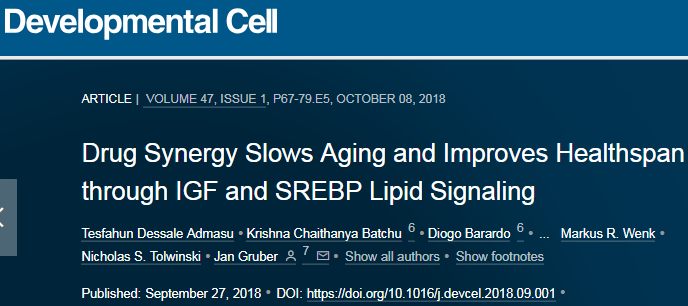Introduction: Extend the life test and make new progress! A team led by Dr. Jan Gruber of Yale-NUS College found a combination of drugs that not only prolongs the healthy lifespan of C. elegans, but also slows its aging rate or means the future. Humans live longer and healthier lives.

The study, published in the journal "Drug Synergy Slows Aging and Improves Healthspan through IGF and SREBP Lipid Signaling," in the Journal of Developmental Cell, provides an important basis for further research into the design of drug combinations that produce the same effects on mammals.
Jan Gruber said: “Many countries in the world, including Singapore, are facing problems related to the aging of the population. If we can find ways to extend our healthy life and delay the aging of the population, we can offset the adverse effects of population aging. This will not only bring medical and economic benefits to all countries, but also provide a better quality of life for their people."
The Gruber team wanted to explore the extent to which healthy life can be extended by combining drugs that target several pathways (potential biological mechanisms) that are known to affect lifespan. For example, rapamycin is a drug that is administered after organ transplantation to prevent the body's immune system from rejecting transplanted organs, but studies have shown that it can prolong the inclusion of nematodes, fruit flies and mice. The lifespan of many organisms.

New record of animal longevity experiment
Gruber and his team applied two or three combinations of compounds for different aging pathways to Caenorhabditis elegans. The results showed that the extension of the average lifespan of C. elegans was particularly evident using the combination of the two drugs, exceeding the effect of each drug alone, and the combined use of the third compound almost increased the average lifespan of C. elegans. Doubled. This effect is greater than any previous intervention in the use of adult animals to prolong life.
On the other hand, drug treatment has no adverse effect on the health of C. elegans. The researchers also found that the treated C. elegans were healthier at all ages and that a greater proportion of them were in a healthy state over their extended lifespan.
This is an important point for potential human aging interventions in the future, as prolonged health, not just life extension, will bring enormous medical and economic benefits. Dr. Gruber said: "We will not only benefit from longevity, but also be away from age-related diseases such as arthritis, cardiovascular disease, cancer or Alzheimer's disease. These diseases currently require very expensive treatments, so long-term health The economic benefits will undoubtedly be enormous."
He also cited a study in 2017 that pointed out that if the aging rate of US citizens fell by 20%, the US government would save $7.1 trillion in public health costs over the next 50 years.
Future human longevity drug research strategy
In this study, Gruber's laboratory collaborated with Nicholas Tolwinski of Yale-NUS, who found that a Drosophila melanogaster also experienced significant life extension after treatment with a similar combination of drugs. These two evolutionarily distinct organisms experienced similar life extensions suggesting that the biological mechanisms that regulate the interaction of these drugs during aging are ancient, making similar interactions between aging pathways more likely to become humans. Target.
Dr. Gruber believes that this study is a theoretical validation that suggests that drug interventions for multiple aging pathways are promising strategies for slowing down aging and significantly extending the healthy lifespan of adult animals.
The next step in this research will be in three areas. First, the extension of this approach aims to design more effective interventions than this study; second, to determine how the drugs interact to delay the molecular and biological mechanisms of aging and prolong life in order to develop computer models that mimic these interactions, Researchers are allowed to test more combinations through computer modeling; the ultimate goal of this series of research will be to develop drug interventions that are sufficiently safe for the human body.
Reference materials:
Drug cocktail almost doubles lifespan of worms
Drug Synergy Slows Aging and Improves Healthspan through IGF and SREBP Lipid Signaling
Souce: NovoPro 2018-10-24
